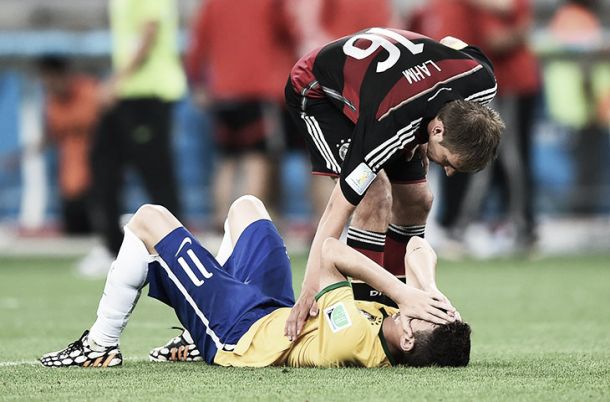In the Estádio Mineirão in Belo Horizonte on the Eighth of July, 2014, the truly unthinkable happened, as the greatest titan of the international game was brought to its knees in front of 60,000 of its own adoring fans. With a brutal, incisive efficiency bordering on the stereotypical, Germany humiliated a Brazil side shorn of their leading lights by cruel injury and petty fouling, firing in seven goals to ensure their place in the World Cup Final in Rio's iconic Maracanã, the symbol of Brazilian football. However, for fans of an earlier generation, the historic stadium evokes memories not only of glorious success, but of the crushing failure which shook a nation and shaped a footballing ideology. Now, the samba has stopped and the riots will surely begin. The class of 2014 have their own Maracanazo.
Make no mistake, this defeat - though the word hardly seems powerful enough - will have serious consequences for the country of Brazil as much as the team. The people, relocated from the homes and denied the education and health infrastructure they demanded to build and expand Brazil's stadiums, were ensured, promised, a Brazilian victory on home soil. Now, with nothing to play for but third place and the possibility of a Messi-inspired Argentinian victory in Rio still looming large (at time of writing), hope will turn to despair and despair will turn to anger. The ugly protests which flared up in the lead-up to the tournament will almost certainly return with a vengeance with a population pushed to its limit by lies and heartbreak. Save for a few half-hearted chants and boos, the Estádio Mineirão was eerily quiet for much of the second half against Germany; don't expect the streets of Brazil to be quite so peaceful tomorrow.
Many of the nation's hopes were, understandably, placed upon the shoulders of Neymar, and his reputation has been kept squeaky-clean by his injury-enforced absence which will surely be touted as the leading cause for the rout. However, fans with slightly longer memories will look back to earlier in the game against Colombia to a moment which arguably had more of an effect on this semi-final than Juan Camilo Zúñiga's brutal knee into the back of their Golden Boy - captain and leader Thiago Silva's petulant and unnecessary foul which saw him pick up the booking which kept him out of this game. With a ridiculous appeal thankfully thrown away by FIFA, Silva's organisation, inspiration and temperament for the big occasion were conspicuous by their absence as beautifully simple German goals rained down upon Julio Cesar's net. It is difficult to imagine Thomas Müller being left totally unmarked from the corner which opened the scoring for Germany had Silva been around, but correctly, and by his own doing, he was in the stands. However, the loss of a captain can hardly be said to justify the absolute dearth of quality which seemed present in Brazil's ranks with Marcelo and £50million man David Luiz hugely underperforming when it mattered the most. It is perhaps unlikely that some of the Brazilian players will ever turn out for the Seleção again, so damaged will the reputations and minds of these young men be following this bruising experience. At very least, the Nightmare of Belo Horizonte could prove to be the death of this once-promising Brazil side who, according to World Cup-winning Juninho were 'taught to play football' by their German counterparts.
A similar story was played out 64 years ago. Brazil were, as far as the home fans knew, the best team in the world, coming up against an established name in world football in their own back garden. If the manner of the defeat to Uruguay in 1950 was not quite as brutal - coincidentally, Brazil's last six-goal defeat also came against Uruguay, in 1920 - the shockwaves which emanated from the Maracanã are still being felt today. Alcides Ghiggia's 79th-minute winner sent a nation into mourning; figuratively, as the stadium and beyond were filled with a "disturbing and traumatic absolute silence" and literally, as several Brazilians reportedly committed suicide as a result. Players were never picked again, lamenting newspapers remained in denial about the whole affair and their once-traditional white strips were cast out for being unpatriotic, never to be worn again. Newspaper Correio da Manhã held a competition to decide what would replace them; the Maracanazo was the birth of a yellow-and-blue Brazil. However, the most significant footballing effect of the 'Maracanã Fall' would prove to be a positive one as, somewhere in São Paulo, a nine-year old child called Edson Arantes do Nascimento reportedly watched his father weep with sorrow and vowed to bring the World Cup back to Brazil; eight years later, he did so, and later went on to score in Brazil's next meeting with Uruguay, a 3-1 victory in 1970. Maracanazo was also the birth of Pelé. Perhaps, despite what the 2014 World Cup couldn't be for Neymar, it could still be a source of determination and hope for another Brazilian child out there.
Whatever the newspapers may cry from the front pages tomorrow morning, this will not be the death of Brazilian football, but with serious problems besetting the country and other nations accelerating away, it is unlikely to be a rebirth. They will come again, be it in four years or in fourty with a talent pool of youngsters which never seems to run dry. With scenes turning ugly on the streets of South America, football should take a step back as it has done so frequently at this wonderful tournament and think not of the millionaires who have lost a game of football tonight, but the country which has lost its spirit.










































